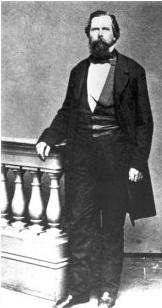John Bidwell
John Bidwell (born August 5, 1819 in Chautauqua County , New York , † April 4, 1900 in Chico , California ) was known throughout California and the United States as an important settler, farmer, soldier, statesman, politician and philanthropist. He gained fame by leading one of the first groups of emigrants on the California Trail and later founding the town of Chico.
Life
Bidwell was born in New York State. He and his parents moved to Erie , Pennsylvania , in 1829 , and to Ashtabula County , Ohio , in 1831 . He studied at the Kingsville Academy and worked as a teacher until 1840, first in Ohio and later in Missouri .
In 1841, Bidwell was one of the first to emigrate to the California Trail . Immediately after Bidwell's arrival in California, John Sutter hired him as managing director. Shortly after James W. Marshall discovered gold near Sutter's Mill in 1848 and thus triggered the California gold rush , Bidwell also began looking for gold and soon found it on the Feather River . The claim was profitable, and the place became known as Bidwell's Bar, where bar here stands for a sandbar in the river, not a restaurant. A settlement emerged from his claim that was later relocated downstream and, after several name changes, was temporarily the most important gold rush settlement in California as Oroville .
However, Bidwell was apparently not interested in gold prospecting per se; rather, he used the proceeds from the mine as start-up capital to establish himself in agriculture. He acquired Spanish land rights in the Sacramento Valley , which he later sold to build a ranch and farm on Chico Creek .
Bidwell fought in the Mexican-American War , where he received the rank of major . He was elected to the California Senate in 1849 and oversaw the censuses in 1850 and 1860 . In 1860 he was a delegate at the national party congress of the Democrats , which he left when the civil war broke out in 1861. In 1863 he was appointed Brigade General of the California Militia. In 1864 he took part in the National Republican Congress in Baltimore ; from 1865 to 1867 he was a Republican member in the US House of Representatives .
His wife, Annie Bidwell , was the daughter of a prominent, high-ranking Washington official. She was deeply religious and engaged in a wide variety of ethical and social issues. Among other things, she was very active in the suffrage and prohibition movement.
The Bidwells married on April 16, 1868 in Washington . Among the guests were the President of the United States , Andrew Johnson , and the future president Ulysses S. Grant . After returning to Chico together, the Bidwells made extensive use of their mansion to entertain their friends. Guests who visited the Bidwells mansion included President Rutherford B. Hayes , General William T. Sherman , Susan B. Anthony , Frances Willard , California Governor Leland Stanford , John Muir , Joseph Dalton Hooker, and Asa Gray .
In 1875, Bidwell was nominated by the Anti-Monopoly Party for election as governor of California . As a staunch advocate of the abstinence movement , he chaired the Prohibition Party conference in California in 1888 and was also nominated by the party as a candidate for governor in 1890. In 1892 he ran for the Prohibition Party for President of the United States. The Bidwell / Cranfill list received 271,058 votes, the equivalent of 2.3% nationwide. This was the highest number of votes, both in absolute and percentage terms, that a Prohibition Party applicant has ever received in a national election.
John Bidwell was a Freemason for a while but left the group believing it was useless. He stated this in a letter to Annie Bidwell on October 17, 1867, found on pages 223-224 in "John Bidwell and California: The Life and Writings of a Pioneer, 1841-1900" by Michael J. Gillisand and Michael F. Magliari, ISBN 087062332X .
Web links
- John Bidwell in the Biographical Directory of the United States Congress (English)
- Full biography on Inn-California
| personal data | |
|---|---|
| SURNAME | Bidwell, John |
| BRIEF DESCRIPTION | American settler and leader on the California Trail, founder of the city of Chico, California |
| DATE OF BIRTH | August 5, 1819 |
| PLACE OF BIRTH | Chautauqua County , New York |
| DATE OF DEATH | April 4, 1900 |
| Place of death | Chico , California |

